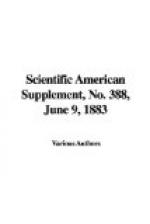Our members will have the opportunity of seeing the process at work during their visit to Middlesbrough, at the Eston Works of Messrs. Bolckow, Vaughan & Co., which are now producing 150,000 tons per annum of steel of the highest quality from the phosphoretic Cleveland ores; and also at the North-Eastern Steel Company’s Works. I believe it is the intention of the latter company to make a pure, soft steel suitable for plates, for which, according to the testimony of Mons. Delafond, of Creuzot, and others, the basic steel is peculiarly suitable on account of its remarkable regularity. I shall have the pleasure of presenting to Mr. Snelus the medal which he has so well deserved.
HONORS AND REWARDS TO INVENTORS.
The presentation to Mr. Thomas is deferred. His arduous labors having affected his health, he is at present in Australia, after having, I am happy to say, received great advantage from the voyage; and his mother, justly proud of his merits, and appreciating fully the value of their recognition by the award which we have made, has requested us not to present the medal by proxy, but to await the return of her son, in order that it may be handed to him in person. But honors, whether conferred by the Crown, by learned bodies, or, as in this case, by the colleagues of the recipient, though they stimulate invention, are by themselves not always sufficient to encourage inventors to devote their labor to the improvements of manufactures or to induce capitalists to assist inventors in the prosecution of costly experiments; and it is on this account that the protection of inventions by patent is a public advantage. The members of our profession, unlike some others, have not been eager to apply for patents in the case of minor inventions; on the contrary, they have freely communicated to each other the experience as to improvement in detail which have resulted from their daily practice. It has been well said that all the world is wiser than any one man in it, and this free interchange of our various experiences has tended greatly to the advancement of our trade. But new departures, like the great invention of Sir H. Bessemer, and important improvements like the basic process, require the protection of patents for their development.
THE PATENT LAWS.
The subject of the patent laws is, therefore, of interest to us, as it is to other manufacturers. You are aware that the Government has introduced a bill for amending these laws. If that bill should pass, it will effect several important changes. It will, in the first place, enable a poor man to obtain protection for an invention at a small cost; secondly, it will make it more difficult than at present for a merely pretended invention to obtain the protection and prestige of a patent; thirdly, it will promote the amalgamation of mutually interdependent inventions by the clause which compels patentees to grant licenses; and, lastly, it will enable the Government to enter into treaties with other powers for the international protection of inventions. If you should be of opinion that these are objects deserving of your support, I hope that you will induce your representatives in the House of Commons to do all that is in their power to assist the Government in passing them into law.




